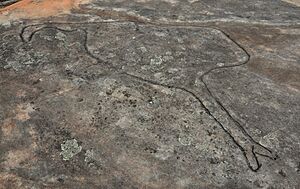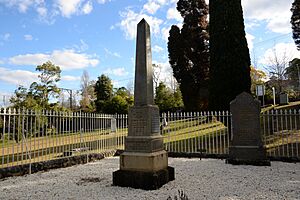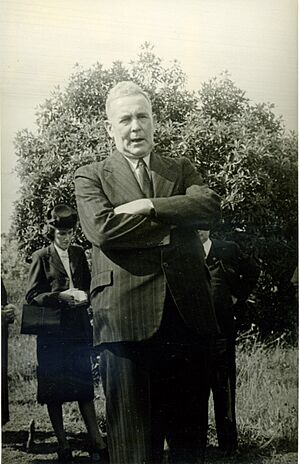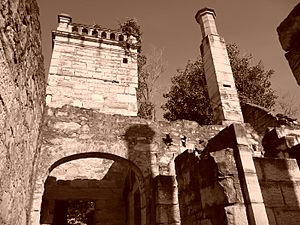Faulconbridge, New South Wales facts for kids
Quick facts for kids FaulconbridgeBlue Mountains, New South Wales |
|||||||||||||||
|---|---|---|---|---|---|---|---|---|---|---|---|---|---|---|---|
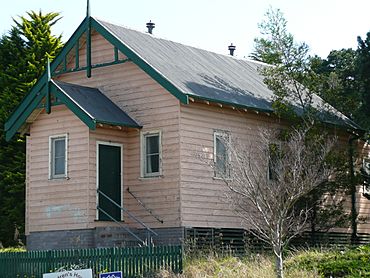
Former chapel in Carpenter Gothic style, Great Western Highway
|
|||||||||||||||
| Population | 4,025 (2016 census) | ||||||||||||||
| Postcode(s) | 2776 | ||||||||||||||
| Elevation | 450 m (1,476 ft) | ||||||||||||||
| Location |
|
||||||||||||||
| LGA(s) | City of Blue Mountains | ||||||||||||||
| State electorate(s) | Blue Mountains | ||||||||||||||
| Federal Division(s) | Macquarie | ||||||||||||||
|
|||||||||||||||
Faulconbridge is a small village in the beautiful Blue Mountains of New South Wales. It's about 77 kilometers west of Sydney, and sits 450 meters above sea level. In 2021, about 4,156 people called Faulconbridge home.
Contents
Exploring Faulconbridge's Past
Ancient History and First Peoples
Long before Europeans arrived, Indigenous Australians lived in the Faulconbridge area. They left many signs of their lives behind. One amazing example is the group of rock carvings in Ticehurst Park. These carvings show different things, like two emus. There are also grinding grooves and waterholes. These waterholes were made or changed to collect rainwater.
European Settlers Arrive
European explorers first came to this area in May 1813. Blaxland, Wentworth, and Lawson camped nearby. They were looking for a way to cross the mountains. Faulconbridge was settled in the 1870s. This happened after the railway line opened up the mountains, making it easier to get there.
Sir Henry Parkes: Father of Federation
One of Faulconbridge's earliest and most famous residents was Sir Henry Parkes. He is known as the "Father of Federation." This means he played a huge role in uniting Australia's states into one country. Sir Henry moved to the area in 1877. He bought a large piece of land, about 600 acres.
It's believed that the original Faulconbridge railway station was built just for him. His home was called Faulconbridge House, and the town was named after it. Faulconbridge was also his mother's maiden name. A small waterfall nearby, Clarinda Falls, was named after his first wife, Clarinda Varney.
Sir Henry Parkes is buried in Faulconbridge Cemetery. His first wife and other family members are buried there too. A plaque on his grave tells about his important life: "Sir Henry Parkes, Father of Australian Federation, five times Prime Minister of New South Wales, arrived in Australia 25 July 1839, he worked as station-hand, Customs Officer and bone and ivory turner. In 1850 became proprietor of Empire Newspaper. Member of New South Wales Parliament from 1854-1894, Sir Henry Parkes is especially remembered for his efforts to develop New South Wales Education and Railways and his work for Federation earned him his title Father of Federation."
Prime Ministers' Corridor of Oaks
On Sir Henry's Parade, you'll find Jackson Park. This park is home to the Prime Ministers' Corridor of Oaks. In 1933, Joseph Jackson, a local politician, gave the park to the council. He wanted every Prime Minister of Australia to plant an oak tree there. If a Prime Minister couldn't, a close family member would plant it.
Jackson greatly admired Henry Parkes. He believed this "Corridor of Oaks" was a perfect way to remember the person who helped create Australia as a nation.
Norman Lindsay's Artistic Home
Faulconbridge was also the home of the famous artist and author Norman Lindsay. His former home and studio is now the Norman Lindsay Gallery and Museum. The National Trust of Australia owns and looks after it. You can find it at the end of Chapman Parade.
Some streets in Faulconbridge are named after characters from Lindsay's popular 1918 children's book, The Magic Pudding. These include Bill Barnacle Avenue and Watkin Wombat Way. While Lindsay's name is used for a political area called the Division of Lindsay, Faulconbridge is actually in the Division of Macquarie.
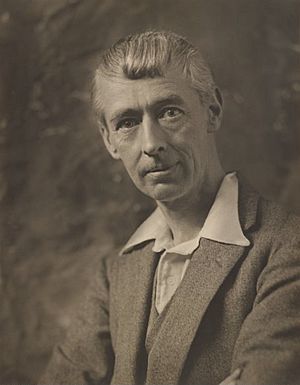
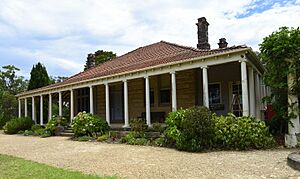
Eurama Ruins: A Glimpse of the Past
About two kilometers west of the Faulconbridge station are the ruins of a house called Eurama. This large stone house was built in 1881. It had unique Tudor-style chimneys. The house was so important that it even had its own railway platform nearby, called Numantia.
The house was later destroyed by bushfires in 1968. The area faced fire threats again during the 2013 New South Wales bushfires.
Important Places and Landmarks
Faulconbridge has several places that are important for their history or special features. These are called heritage-listed sites:
- Blue Mountains National Park: Blue Mountains walking tracks
- 14-20 Norman Lindsay Crescent: Norman Lindsay Gallery and Museum
Faulconbridge's Community
Population Snapshot
In the 2016 Census, there were 4,025 people living in Faulconbridge. Most people, about 82.8%, were born in Australia. The next largest group, 5.3%, were born in England. Almost everyone, 92.7%, spoke only English at home. When asked about religion, the most common answers were No Religion (34.8%), Catholic (19.7%), and Anglican (18.3%).
Local Shops and Services
Faulconbridge has two main shopping areas. One area, known as Coomassie shops, has a petrol station, a Chinese restaurant, a tax accountant, a hairdresser, a vet, a takeaway shop, a pharmacy, and a liquor store. The second area is close to the railway station. It has a tea room called Chapters & Leaves, another petrol station, a hairdresser, a physiotherapist, a beautician, a home builder, and a large preschool.
Nature and Environment
Unique Plants
Faulconbridge is home to a rare plant called the Faulconbridge Mallee Ash. This special plant is found only in this area.
 | Misty Copeland |
 | Raven Wilkinson |
 | Debra Austin |
 | Aesha Ash |



